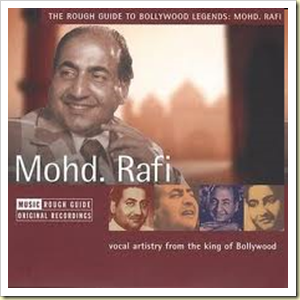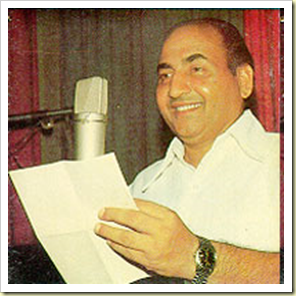FOREVER MOHD RAFI:
There was a period in the early seventies, precisely from 1972 to 1976, when it was considered that Rafi was eclipsed by Kishore Kumar. Was it really so?
Well, the reasons can be many. First of all, it was given that Rafi refused to sing for nearly eight months due to certain beliefs he suddenly developed, otherwise, perhaps Rafi would have sung all the hit songs of ARADHANA, due to which KK became popular and became the voice of the then heart throb Rajesh Khanna. Though Rajesh had Rafi as main play back Singer in other movies released during the period like MEHABOOB KI MEHENDI, THE TRAIN, DO RAASTE, apart from the two songs in ARADHANA itself, some how the voice of KK got stuck with RK. And Producers, Directors, Actors rushed to KK to make hits like ARADHANA, but all other MDs were not SDB and the standard of music in most of these movies was far below that of ARADHANA. And these people were also handicapped by the fact that Rafi refused to sing for a long period. Changing tastes, commercial interests, a combination of different factors made the situation very complicated and perhaps, the down slide of Hindi Film Music started during this period.
One of my friend used to say that a song can appeal to your ears, but will soon fade out after sometime like most of the songs of today, but a great quality song will always appeal to your heart and remain there forever. How true, most of the songs of fifties and sixties are still etched in our memory but most of the songs of mid seventies and eighties are hardly remembered.
Mohd RafiFor Rafi fans having brought up on more or less on strict Rafi diet, it was especially frustrating to listen to ONLY other Singers, when the BEST of all reduced his songs. That too, just prior to this period, we had wonderful Rafi songs from movies like CARAVAN, DO RAASTE, MEHABOOB KI MEHENDI, HIMMAT, HUMJOLI, THE TRAIN, MELA, MAA AUR MAMTA, GANWAR, ANDAZ, BHAI BHAI, etc.
When Rafi realized and took the challenge, to the immense joy of his Fans, he could once again give quality songs, but no doubt, the quantity had come down considerably. Even in popular Film music programs like Vivid Bharati and Radio Ceylon and especially Binaca Geet Mala, the number of Rafi songs could be numbered to one or two, but there was a considerable increase in the number of KK songs. But Rafi being Rafi, he gave good songs as usual in the same voice, same melody, with same distinction with which he had enthralled countless of his Fans for the previous three decades. The QUALITY in the following songs recorded by MR during the period of 1972 to 1976 remained intact.
In fact, when "Main Ek Raja Hun" (UPHAAR) with LP as MD came on Binaca Geet Mala, the compeer, the redoubtable Amin Sayani remarked that with this song, Rafi would make a come back. How prophetic his words were! The period also had wonderful songs from LP like "Aaj Mausam" (LOAFER), "Aa Batandege Tuzhe" (DOST) with Lata and Shatrughan Sinha, "Bade Bewafa Hain Yeh" and "Hasin Dilruba" (ROOP TERA MASTANA), "Ke Aaja TerI Yaad Aayi" (CHARAS) with Lata and Anand Bhakshi, Solos "Ik Na Ik Din Ye", "Tere Nain" and title song of GORA AUR KALA, "Patta Patta Boota Boota" (EK NAZAR) with Lata, "Nafarat Ki Duniya Ko" (HAATHI MERE SAATHI), "Main Wohi, Wohi Baat" (NAYEE DIN NAYEE RAAT), "Na Zat Yamla" and a duet with Lata "Morni Re Morni" (PRATIGYA), "Koi Nazarana" and title song with Lata (AAN MILO SAJANA), two solos "O Meri Mehabooba" and "Are Maine Tuzhko Chaha" and with Mukesh "Saat Ajube" (DHARAMVEER), "Tere Ishq Ka Muzhpe" with Asha and "Hapte Mahino Barson Nahin" with Lata (NAGIN), "Tere Hathon Me Pehanake Chudiyan" and "Chalo Re Doli Utao". "Tu Gaddar Sahi" (GADDAR) was another hit song.
KA gave "Tumse Door Rahke" (ADAALAT) with Lata, "Wada Karle Sajana" (HAATH KI SAFAI) with Lata and "Deewane Hain Deewanon Ko Na" (ZANJEER) with Lata and "Main Tuzhase Milne Aayi Mandir Jaane Ke Bahane" (HEERA) with Lata and "Yeh Raat Hai Pyaasi Pyassi" (CHOTI BAHU). Another musical was BAIRAAG, the songs became hit during this period though the movie was released much later. It had two duets with Asha "Sare Shahar Me" and "Peete Peete" apart from the Lata duet "Are Sunore Suno". MARYADA had "Mohabbat Ke Suhane Din", Lata duet "Tu Bhi Aaja" and Asha duet "Humse To Hasina". SAMJHAUTA had two wonderful solos "Badi Door Se Aaye Hain" and "Sabake Rahte".
Madan Mohan during this period gave "Jis Din Se Maine" with Asha and solo "Are Hasnewalon" (PARWAANA), "Tum Jo Mil Gaye Ho" and "Ye Mana Meri Jaan" (HANSTE ZAKHM), "Chadi Re Chadi Kaise" (MAUSAM) with Lata as well as some patriotic songs in HINDUSTHAN KI KASAM.
SDB as usual, came out with stunning numbers like "Tere Nainon Ke Me Deep" (ANURAAG) with Lata, "Teri Bindiya Re" (ABHIMAAN) with Lata, "Ae Mere Dil" (US PAAR), "Sare Gama" (CHUPKE CHUPKE) with KK.
RDB, the so called KK Fan also gave some hit numbers with MR like "Chura Liya Hain Tumne Jo Dil Ko" with Asha and title song with KK (YADON KI BARAAT), "Ek Shok Hasina Se" (CHAANDI SONA) with Mannadey, "Kahe Ko Bulaya" with Lata and solo "Tere Attaroo" (SHAHJADA) and "Ae Jaane Wafa" (CHALIA).
Naushad gave "Nayi Hawa Me" (GAON HAMARA SHEHAR TUMHARA) and title song of TANGEWALA.
OPN after patching up with MR gave beautiful songs like "Zamane Ki Aankhon Ne" (EK BAAR MUSKURADO), "Hont Hai Tere Do Laal Heere" with Dilraj Kaur and "Kuch Aur Nahin Bas Dyaan Tera" with Mannadey (HEERA MOTI). In fact, OPN is suppose to have remarked, ˜give me one film, I will show you who is Rafi?' which is sufficient proof of OPN's acceptance of Rafi's superiority.
SJ, the true Rafi fans came out with solos "Jab Mohabbat Jawan Hoti Hai", "Mere Sapnon Ki Raani", and duets with Asha "Mil Gayi Mil Gayi" and "Na Rooto Na Rooto Na" (JAWAAN MOHABBAT) as well as "Maati Ke Jalte Deepak Ki".
MD Ravi came out with stunners in "Door Rahakar" and "Matlab Nikal Gaya" (AMANAT) and "Mere Dost Tuzhe" (DHARKAN) and "Aaj Mere Yaar Ki Shaadi Hai"
Rajesh Roshan gave "Sazi Rahi" (KUNWARA BAAP) with Mehamood, "Kahun Kya" (GINNY AUR JHONNY) with Asha and "Ghadi Milan Ki Aayi" (EK BAAP CHE BETE) with Sulakshana Pandit and another duet in PRIYATAMA – "Na Na Na Na".
There were other quality songs like "Apni Aankhion Me Basakar" (THOKAR), "Dil Ne....... Pyaar Kiya Hai Ek Bewafa Se" (SHARARAT) under MD Ganesh, "Kahin Aisa Na Ho" (MILAP) under MD Brij Bhushan, "Kahin Ek Masoom, Nazuksi Ladki" (SHANKAR HUSSAIN) under Khayyam, "Teri Galiyon Me Na" (HAWAS) under Usha Khanna, "Raaj Ki Baat" and "Main Tera Gunahagar Hun" (DHARMA) with Asha under Sonik Omi, "Dil Ka Suna Saaz" (EK NARI DO ROOP) under MD Ganesh, etc. which clearly showed Rafi's class. Two other movies with Rafi as main singer were AAP KE DEEWANE and ZINDA DIL. RAM BALRAM and PROF. PYAARELAL also had some MR songs.
If one observes closely the above songs, majority of these songs have LP as MD and followed by others like KA, RDB, RR, MM, SDB, OPN, Naushad, Usha Khanna, etc. Does it reveal some thing? I have listed only some of the quality songs which I could immediately recollect and which I have enjoyed listening to, though Rafiji sang many more songs during this period.
Later, once again Rafi wave started with Laila Majnu with Music by the great Madan Mohan followed by AAA, HKKN, Aasha, Shaan, Sargam, Abdullah, Naseeb, Mrig Trishna (the classic "Nava Kalpana Nava Roopase"), ZKDH, Karz, Swayamvar, Sazan Ki Saheli, Naach Uthe Sansar, etc. reestablishing Rafi as no. 1 Singer again in terms of quantity though he was always no. 1 as for as quality was concerned. And after 1976, the songs of Rafiji as usual occupied the main space in programs like BGM, VB, RC, etc.
Mr. Nitish Sinha from Rourkela has already written a very good article on the same subject, but I thought I could substantiate further on the topic. I am sure other Rafians can come out with scores of other songs sung by Rafiji during this period.
This entry was posted on Saturday, February 23rd, 2008 at 9:37 pm and is filed under Meri Awaaz Suno. You can follow any responses to this entry through the RSS 2.0 feed. You can leave a response, or trackback from your own site.
7 Responses to "Quality Rafi Songs from So Called Lean Period"
1.
1
A S MURTY Says:
February 23rd, 2008 at 10:28 pm
Fabulous writing by Mr. Gurumurthy Ji. You have practically named almost all the movies of that period where Rafi Sahab once again produced gems of songs, in his most inimitable voice. I particularly liked reference of one song "Bade Bewafa Hain Yeh Husnwale Par Teri Baat Kuch Aur Hai" (ROOP TERA MASTANA). That is a grandstand rendition once again but not very popular. I request some of the rafians having the song to kindly send it to me at asmurty2@rediffmail.com. Then again, although the movie Mehboob ki mehendi was mentioned, one song "pasand aa gayi hai ik kafir haseena" is again a very unusual style but very appealing song. This again went unnoticed but is a class song by itself. One correction though Gurumurthy ji, the song from "amaanat" is "matlab nikal gaya hai toh pehchaante nahin" and not as stated. Several other songs mentioned in the article emphatically establish the supremacy of rafi sahab over all other singers. perhaps rafi sahab had cut down on his singing, else the list would be much much lengthier. great article and great piece of writing too. thanks.
2.
2
Suraj Says:
February 23rd, 2008 at 10:44 pm
Rafi was #1 for 20 years and even in the same film he was the voice for multiple characters. Very few like to hear one voice all the time. Eventually people wanted to take a break from his voice. This is why great Rafi songs in early 70s did not get due justice THEN (people were taking a BREAK) but today are revered (people are not JUST coming from a 20 year streak by Rafi as voice for everyone). Raj Kapoor was clever to want a fresh new voice for Bobby (1973). Had the songs been in Rafi's voice, today they would be even more revered than they are. In 1973 they would have been relatively ignored like the other Rafi classics from Abhimaan, Haathi Meri Saathi, Yaadon Ki Baraat. Shocking to imagine songs by Mahendra Kapoor & Shailendra Singh being more popular than Rafi's from the 1971-1975 period but it happened. Never for musical reasons but the "break" factor. Shankar Jaikishan went down in early 1970s because they remained loyal to Rafi (besides Sharda, rifts, alcohol). If they replaced Rafi with new voices they would have remained #1 even in early 70s against RD Burman. Of course Rafi songs from early 71-75 easily outstrip the Mahendra Kapoor & Shailendra Singh songs from that period in the TEST OF TIME 30 years later today (heavenly voice can never be replaced) - but back then during the wave & trends it was a different scenario.
Courtesy: Ruffian tribute to Mohd Rafi.
.



